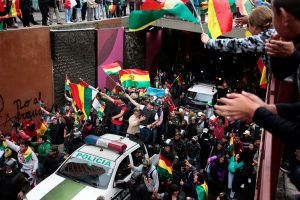By: Nicole Vila, 2L
In 2019, much of Latin America erupted in political turmoil—Peru’s President dissolved the country’s Congress; Honduras’ President allegedly received bribes from drug lords; and protests in Ecuador caused government members to flee the capital city. A downturn in economic growth throughout the region exacerbated the issue many countries faced: lack of a strong, central government. As a result, “Latin American citizens have become increasingly frustrated with corruption. . . .” The spread of COVID-19 throughout Latin America (and the world) has only highlighted and strengthened these political issues. Bolivia is no exception.
In November, Bolivia’s then-President, Evo Morales, resigned after protesters accused him of “undermining democracy to extend his rule.” At that time, he had served as president longer than any current head of state in Latin America. Morales suspected he was the victim of a coup. Soon after, Jeanine Áñez took over as interim President. Her responsibility was to hold new elections as soon as possible in order to democratically elect Morales’ successor. However, as COVID-19 continued to spread through the country, some accused Áñez of using the pandemic as an excuse to extend her presidencyand further her own political ambitions. After Áñez announced her candidacy for President, she postponed the May 3rdelections, stating the country should wait until the worst of the pandemic has passed.
However, the pandemic’s hold on Bolivia has only worsened since then. Officials suspect that the reported mortality figures caused by COVID-19 are vastly undercounted due to limited testing, a lack of resources, and the existing political crisis. The country’s rise in death, adjusted for its population, is more than twice that of the United States. The decentralized government is largely to blame for the country’s inability to overcome the pandemic. “[Áñez] is not recognized as a legitimate leader, which makes it extremely difficult to coordinate a complex response that the pandemic requires,” said Santiago Anria, a Bolivia expert at the Dickinson College in Pennsylvania.
In August, anti-government protests erupted in Bolivia demanding elections take place on September 6, a previously agreed-upon date. One protester stated, “[w]e have a government that is illegitimate because we haven’t elected it.” The protesters appreciate the risk of being exposed to COVID-19 at the election polls; however, they prefer to have a democratically elected President in office rather than allow Áñez to continue her reign.
On August 6, the government enacted a law which mandates the Presidential election to be held on October 18, with criminal penalties imposed if there are any efforts to postpone once again. While this is not the September 6th date protesters preferred, the October election will hopefully lead to the resolution they hoped for before the year is over. However, with a year riddled by political turmoil, we will have to wait until then to see how successful the election truly is.





